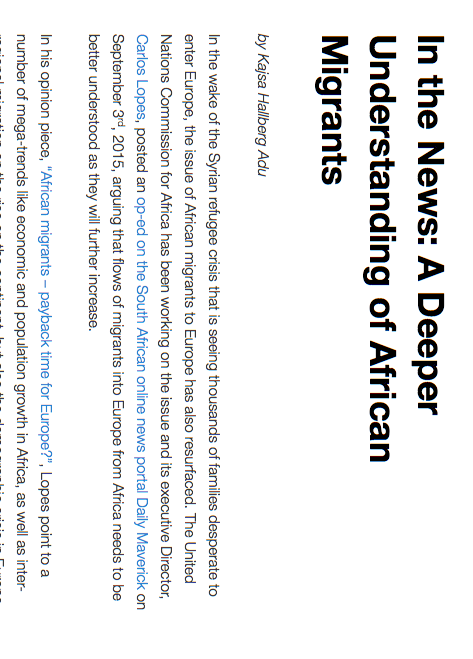 This morning as I was brainstorming migration topics for my Migration Monday series, I was happy to discover the Danish Institute for International Studies (DIIS) have recently published a working paper on Ghana’s Migration and Development Policies.
This morning as I was brainstorming migration topics for my Migration Monday series, I was happy to discover the Danish Institute for International Studies (DIIS) have recently published a working paper on Ghana’s Migration and Development Policies.
The paper is written by Dr. Nauja Kleist, who I met two years back over a bowl of Maquis Tante Marie soup in Accra, and is called
“Let us Rebuild our Country” Migration-development scenarios in Ghana (the link takes you to a page where you can download the working paper).
What is wonderful with this type of well-written, current and to-the-point publication is that it summarizes big chunks of data: in this case the recent history of Ghanaian migration policy to today, views from high level state officials, diaspora and academics on those policies and finally the implementation of them. Which proves to be minimal. Or in Kleist’s vocab
“Migration-development scenarios in Ghana thus have a strong symbolic and performance dimension, constituting a policy spectacle with several audiences” (my italics).
In looking closer on this so called spectacle; what is new in migration policy, is that migration is not only seen as a threat, but also as an opportunity to increased development. In accordance, migrants are seen “as development actors”, Kleist suggests in the paper. This follows an international agenda to couple the two streams of discourse.
Although the international agenda seeping through African policy making does not strike Kleist, nor me, as strange (Kleist soberly states “Ghanaian migration policies and initiatives not only reflect efforts to strengthen national development, but also are shaped by European agendas”), something else does. Why is that in the “Migration-Development nexus” which sees opportunity in migration (“if well managed”), remittances or a returnee is seen as great news, while the alternative gains – a native working in his/her country of origin – is never assessed?
Kleist addresses this only indirectly, but quite elegantly, by addressing the problems of the overtly positive scenario advocated by some Ghanaian officials:
“win-win-win situations for the sending and recieving countries and the migrant alike…not only presume ‘orderly’ and informed migration decisions and processes but also a range of other preconditions… emigrants are assumed to be from professions characterized by unemployment rather than a shortage of labour to avoid brain drain; in addition this scenario presupposes that social frictions primarily are rooted in (presumed) unemployment and not in other political, social or economic structures. Likewise, this scenario presumes that migrants get employment that match and upscale their qualifications, are exposed to high-level technology, and finally, that they return to Ghana and are able to utilize their new skills there.”
However, many of the Ghanaian migrants I know are well qualified, but work abroad in jobs below their qualifications. Still, Ghanaian migration provides opportunities for class mobility/salaries one can live on/education etc. for individuals. Migrants send money home and sometime, just like Kleist reports buy land, property and come home to retire. But does it lead to development for migrant sending countries?
Ultimately, Kleist states the obvious regarding the win-win-win scenario: “Such preconditions are rarely fulfilled” and mentions, without going into any detail, that there are also conflicts of interest between migrant sending and receiving nations. I agree and have written about such conflicting interests like the strategies the EU (with inspiration from Canada and the US) employ to sustain its knowledge economies of today and tomorrow.
I think it is where Kleist signs off that my research will pick up. I understand that sometimes you have to take what you can get (a returning migrant that might or might not have relevant skills or a bundle of her cash in an envelope), but isn’t it very clear that is always less than what you could have had (Africans finding gainful employment and paying taxes in their home countries)?
Instead of aiming for “well managed” migration, can migrant sending countries not aim higher?






